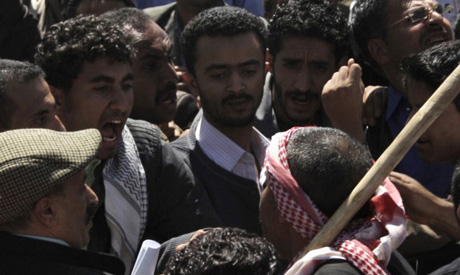A crowd of about 3,000 protesters, mainly lawyers and students, tried to march from Sanaa University to Al-Tahrir square in the city centre, where Saleh's supporters have been camped since last week, but were prevented by security forces who erected barbed wire, witnesses reported.
Other protesters threatened to march to the headquarters of police intelligence. Tension between anti and pro-government supporters in Yemen continues to rise.
On Monday, police prevented 500 anti-government protesters and a rival group of around 100 supporters of Saleh from clashing at Sanaa University. This same scene has been going on for the past 19 days.
The protests in Yemen come as the backdrop to the national uprisings in Tunisia and Egypt, where the presidents of both countries were overthrown.
In a move to manage the situation President Saleh halted constitutional procedures which may have allowed him to assume the presidency for life, and possibly pave the way for his son, the chief of the Republican Guard, to succeed him.
However, security measures are being implemented in an effort to control dissent.
A statement by the National Defence Council in Sanaa is pushing for a law allowing the government to tap phone lines and monitor other communications, such as electronic and regular mail and telegrams. This has fuelled anger in the Yemeni streets.
Sageen Organisation head, lawyer Abdul-Rahman Barman, said of the decree that it violates article 53 of the Yemeni constitution which guarantees freedom of communication to citizens.
Other security measures include harassing demonstrators and the arrest of activists and opposition figures, among them 220 held in Taiz, whom the protestors have asked to be released today, but whom the opposition said had already been freed.
Human Rights Watch criticised Yemen security for what they described as “unnecessary brutality” which includes using electroshock tasers against demonstrators.
Yemen's demonstrations are led by the political opposition bloc, the Joint Meeting Parties (JMP), which includes the Islamist reform party, Islah, the former ruling party of South Yemen, and several other smaller parties.
Islah, the leading party in the JMP, is reformist-minded, and its calls for reform are the most evident. This is why calls for the overthrow of the regime do not resonate as the main demand of the protestors, although it has been chanted before.
This, analysts say, may cause the JMP to focus its main efforts on 2013, in the hope of winning the presidential elections.
“The revolution is underway. Its massive explosion is only delayed by the nebulous position of the opposition, represented by the Joint Meeting parties (JMP),” says Middle East expert and prominent blogger Juan Cole, countering claims by others that the extent of the protests is not significant enough for a revolution
